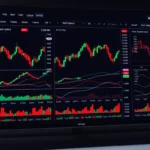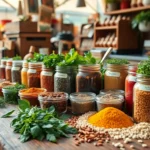Effective Strategies for Wholesalers to Expand Spice Distribution and Grow Business
Understanding the Critical Role of Wholesalers in the Spice Industry
The spice industry stands as a cornerstone of global culinary traditions and food manufacturing sectors. Wholesalers serve as vital intermediaries, bridging the gap between manufacturers and retail outlets, restaurants, and food processors. Their role is not just about bulk purchasing; it involves ensuring the timely supply of high-quality, authentic spices that meet consumer demands and regulatory standards. As the market becomes increasingly competitive, wholesalers need to leverage strategic approaches to enhance their distribution networks, build robust relationships, and reinforce their market presence.
Currently, the industry is witnessing rapid changes driven by consumer preference shifts toward organic, certified, and exotic spices, along with increased awareness of food safety standards. To stay ahead, wholesalers must prioritize sourcing authentic products, such as those offered by reputed manufacturers like Spice Nest, which are certificated, traceable, and comply with international standards.
What Defines a Successful Spice Wholesaler?
Successful spice wholesalers embody a combination of operational efficiency, market intelligence, and strategic partnerships. Key qualities include:
- Authentic Product Portfolio: Offering genuine, certified spices and value-added products like cooking pastes, jams, and dehydrated foods enhances credibility.
- Reliable Supply Chain: Maintaining a consistent supply of fresh, high-quality spices, including whole spices, spice powders, and specialty items like superfoods and dehydrated herbs.
- Customer-Centric Approach: Building strong relationships with clients through prompt service, flexible payment options, and tailored offerings.
- Market Adaptability: Responding swiftly to emerging trends such as organic products, health foods, and international flavors.
A good example is Spice Nest, a leading manufacturer and exporter known for its broad product range, certifications, and presence in major food exhibitions globally, which provides an edge for wholesalers seeking reliable sources.
Key Benefits of Partnering with Reliable Wholesale Suppliers
Collaborating with reputable manufacturers offers numerous advantages:
- Product Authenticity and Quality Assurance: Certified suppliers like Spice Nest ensure products are genuine, safe, and meet international standards.
- Competitive Pricing: Bulk purchasing from established suppliers reduces costs, enabling better margins and competitive offerings.
- Favorable Payment and Delivery Terms: Reliable suppliers often provide flexible payment options and consistent delivery schedules, minimizing supply disruptions.
- Access to Exclusive and Diverse Product Ranges: From specialty spices to ready-to-eat foods, partnerships facilitate diversification and innovation.
- Support for Compliance and Certification: Trusted suppliers assist in adhering to food safety standards, which is essential for expanding into international markets.
Establishing strategic alliances with trusted manufacturers ensures stability and growth, empowering wholesalers to meet evolving consumer demands efficiently.
Market Trends Shaping the Spice Wholesale Sector
The global spice market is dynamic, influenced by several key trends:
- Organic and Natural Product Preference: Consumers increasingly seek organic, pesticide-free spices, prompting wholesalers to source and stock certified organic offerings.
- Health and Wellness Focus: Superfoods, dehydrated herbs, and functional foods like tamarind and dry fruits are gaining popularity for their health benefits.
- Innovative Packaging and Convenience: Ready-to-eat gravies, chutneys, and chutney pastes cater to busy consumers demanding convenience without compromising quality.
- International Flavour Diversity: Exotic and regional flavors, such as Rajshthani-style chutneys or Kolhapuri masalas, open avenues for niche markets.
- Digital Transformation: E-commerce and B2B digital platforms enable wholesalers to reach broader markets efficiently, reduce transaction costs, and improve supply chain transparency.
Staying attuned to these trends allows wholesalers to tailor their inventory, marketing strategies, and partnerships to sustain growth.
Building and Maintaining Strong Relationships with Wholesalers
Effective Communication and Trust-Building Strategies
Clear and consistent communication forms the foundation of successful wholesaler relationships. Regular updates on product availability, quality standards, and market trends foster transparency. Building trust involves demonstrating reliability through consistent delivery, prompt responses, and honoring commitments.
Negotiation Tactics for Competitive Pricing
Negotiation should aim for win-win outcomes. Understanding the wholesale buyer’s needs, offering flexible payment terms, volume discounts, and bundled deals can lead to long-term collaborations. Employing data-driven approaches, such as analyzing purchase patterns and market demand, enhances negotiation effectiveness.
Post-Sale Support and Customer Satisfaction
Providing ongoing support, including technical assistance, quality feedback, and responsive after-sales service, solidifies relationships. Regularly gathering feedback helps identify areas for improvement and customizes offerings to customer needs—boosting satisfaction and loyalty.
Optimizing Your Supply Chain for Wholesale Success
Sourcing Authentic and Certified Spices
Authenticity begins with sourcing raw materials directly from trusted manufacturers such as Spice Nest, which ensures certification and traceability. Certification like ISO, Organic, and HACCP compliance assure buyers of product integrity.
Inventory Management Best Practices
Efficient inventory management involves balancing stock levels to meet demand without overstocking. Implementing inventory software that tracks expiry dates, batch numbers, and turnover rates helps prevent wastage and ensures freshness.
Ensuring Consistent Quality and Freshness
Regular quality audits, robust quality control protocols, and maintaining cold chain logistics for perishable items are critical. Working closely with manufacturers ensures uniformity in product quality, reducing customer complaints.
Effective Marketing and Selling to Wholesalers
Creating Attractive Bulk Purchase Offers
Offering tiered discounts, seasonal deals, and discovery bundles can incentivize larger orders. Highlighting product certifications, unique ingredients, and health benefits adds value.
Utilizing Digital Platforms for Wholesale Outreach
Developing a professional website, engaging on B2B marketplaces, and leveraging digital marketing channels like social media and email campaigns broaden reach. Providing easy ordering processes and detailed catalogs enhances user experience.
Participation in Major Food and Beverage Trade Shows
Showcasing products at prominent trade events like Biofach, FOODEX, and Gulfood provides opportunities for direct engagement with international buyers and industry influencers. Preparing professional samples, presentations, and marketing collateral maximizes impact.
Measuring and Improving Wholesale Performance
Analyzing Sales Data and Customer Feedback
Regular review of sales metrics, order frequency, and customer feedback reveals market trends and product performance. Using analytics tools can identify top-selling items, seasonality, and gaps in offerings.
Implementing Feedback for Product and Service Improvements
Acting on customer suggestions and complaint data allows refinement of product quality, packaging, and service delivery—thus enhancing competitiveness.
Scaling Up Operations Based on Market Demand
Data-driven forecasting enables strategic expansion, whether increasing product varieties, warehouse capacity, or geographic reach. Partnerships with innovative manufacturers can facilitate smooth scaling.









